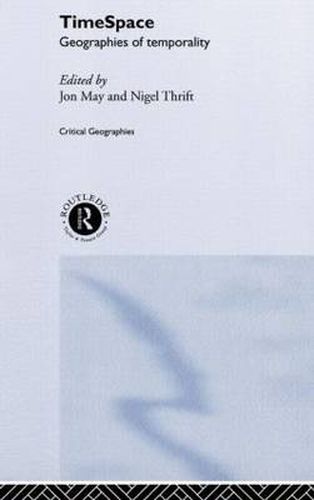Readings Newsletter
Become a Readings Member to make your shopping experience even easier.
Sign in or sign up for free!
You’re not far away from qualifying for FREE standard shipping within Australia
You’ve qualified for FREE standard shipping within Australia
The cart is loading…






The social sciences and humanities have recently taken a ‘spatial turn’, with workers drawing upon a range of geographical concepts and metaphors to explore an increasingly complex and differentiated social world. Timespace is the first book to bring these interests together. Rather than thinking in terms of either time or space, it argues that our accounts of the social world must draw instead upon the more complex notion of Timespace. With contributors drawn from a range of disciplines, including Geography, Sociology, Gender Studies, International Studies and English Literature, Timespace is wide-ranging in both substantive and theoretical scope. In the first part of the volume, contributors explore the ‘Making’ and ‘Living’ of Timespace. Chapters examine past and present changes in time and time consciousness and the meaning of such changes for the people living through them; changing understandings of Modernisation and Progress and the geographies that underpin them; and the role that understandings of Timespace play in projects of national and racial identity and the politics of Belonging. In the second part of the volume, ‘Living-Thinking Timespace’, attention is turned to the ways in which we might most usefully conceptualize Timespace itself - whether drawing on the perspectives of a rejuvenated time-geography, some variation of Lefebvre’s rhythm analysis, phenomenology or Buddhism. At the heart of the volume lies a challenge to all those who have uncritically embraced the recent ‘spatial turn’ and to those working in the field of time studies to think in terms of neither only space or time but a multi-dimensional, partial and uneven Timespace. Mike Crang, University of Durham, UK; Karen Davies, Lund University, Sweden; Geoffrey DeVerteuil, University of Southern California; USA, John Frow, University of Edinburgh, UK; Martin Gren, Universit
$9.00 standard shipping within Australia
FREE standard shipping within Australia for orders over $100.00
Express & International shipping calculated at checkout
The social sciences and humanities have recently taken a ‘spatial turn’, with workers drawing upon a range of geographical concepts and metaphors to explore an increasingly complex and differentiated social world. Timespace is the first book to bring these interests together. Rather than thinking in terms of either time or space, it argues that our accounts of the social world must draw instead upon the more complex notion of Timespace. With contributors drawn from a range of disciplines, including Geography, Sociology, Gender Studies, International Studies and English Literature, Timespace is wide-ranging in both substantive and theoretical scope. In the first part of the volume, contributors explore the ‘Making’ and ‘Living’ of Timespace. Chapters examine past and present changes in time and time consciousness and the meaning of such changes for the people living through them; changing understandings of Modernisation and Progress and the geographies that underpin them; and the role that understandings of Timespace play in projects of national and racial identity and the politics of Belonging. In the second part of the volume, ‘Living-Thinking Timespace’, attention is turned to the ways in which we might most usefully conceptualize Timespace itself - whether drawing on the perspectives of a rejuvenated time-geography, some variation of Lefebvre’s rhythm analysis, phenomenology or Buddhism. At the heart of the volume lies a challenge to all those who have uncritically embraced the recent ‘spatial turn’ and to those working in the field of time studies to think in terms of neither only space or time but a multi-dimensional, partial and uneven Timespace. Mike Crang, University of Durham, UK; Karen Davies, Lund University, Sweden; Geoffrey DeVerteuil, University of Southern California; USA, John Frow, University of Edinburgh, UK; Martin Gren, Universit